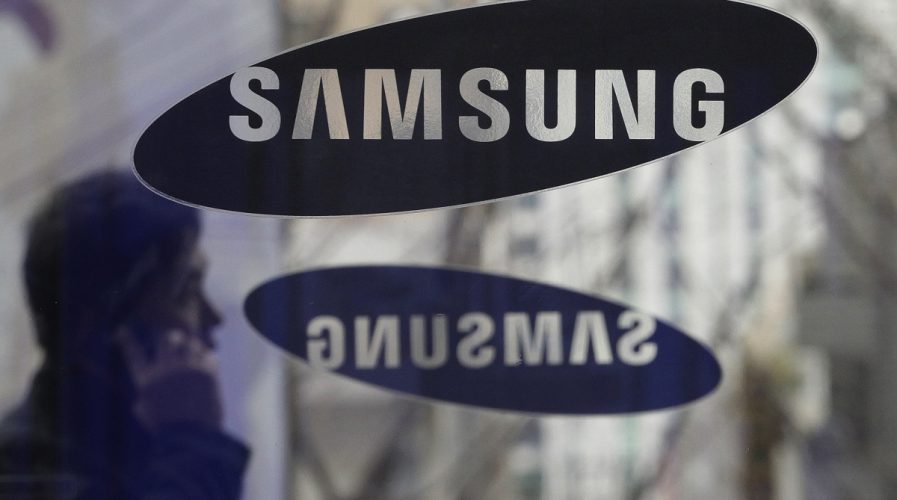
A man with a mobile phone walks by the Samsung Electronics logos at its headquarters in Seoul. Source: AP
As activist investor pushes for change, Samsung reveals plan to boost shareholder value
ELECTRONICS giant Samsung announced that it will disclose its proposal to increase shareholder value. The announcement comes as Elliott Management Corp. pushes Korea’s most valuable company to split by early 2017.
Recent problems
Samsung has been recently plagued by problems caused by faulty batteries in its flagship device, the Galaxy Note 7. Unveiled in August this year, the Note 7 launched with very positive responses, breaking pre-order records in South Korea and causing supply shortages in other markets.
However, this high was dashed after reports of Note 7 devices catching fire and exploding due to battery issues. Samsung issued two worldwide recalls of all Note 7 devices to address the issue, but eventually decided to discontinue the product. Samsung even issued an apology to all customers.
SEE ALSO: Samsung: Nearly all Galaxy Note 7s replaced, but washing machine woes emerge
The recall hit Samsung hard in the third quarter of 2016 with Samsung’s operating profit dropping a third compared to last year. Analysts estimate that Samsung stands to lose at least US$17 billion.
Restructuring calls

Samsung Electronics’ Galaxy S7 is displayed at its shop in Seoul, Seoul. Pic: Reuters
U.S. fund Elliott Management pushed a proposal to split Samsung into two entities: an operating company and a holding company. Elliot also proposed adding independent board members all in an effort to increase transparency in the company aside from achieving a clearer ownership structure and increased stock value.
Such a move seeks to challenge Samsung’s chaebol structure. In South Korea, a chaebol is a business conglomerate owned by a family dynasty. The structure is often criticized for using cross-shareholdings in order to prevent outside influence.
The Lee family controls Samsung, and the company is expected to transition to the third generation through current vice chairman and heir apparent Jay Y. Lee. Among prominent chaebol aside from Samsung are LG and Hyundai.
Thought the #chaebol was untouchable. https://t.co/5Wt8jIKPV3
— Robert Lee (@roberee) November 29, 2016
In 2015, Paul Elliott Singer, Elliott Management’s fund manager, lost a legal battle to halt the sale of Samsung’s construction firm C&T to the Lee family’s holding company Cheil Industries. Elliott owned a seven percent stake in C&T. Singer believes that the selling price was too low.
Stock buyback, increased dividends
Samsung’s plan involves buying back stocks and increasing dividends. The company will be using 50 percent of free cash for shareholder returns. The rest is to be used for share buy backs which will be done by January of 2017. The figure brings Samsung’s free cash at around US$8.1 billion return in 2016. Samsung has already made an earlier buyback worth nearly US$10 billion.
Elliot may be waiting a longer time for sweeping changes to be made in the company. Aside from a clearer structure, Elliott is also demanding a special dividend for shareholders amounting to around US$26 billion. Only one additional board member is scheduled to be added, as opposed to Elliot’s call for three.
SEE ALSO: Huawei says Samsung’s Galaxy Note 7 disaster reminder to focus on quality
The push for more shareholder-friendly policies also comes amid the political turmoil in South Korea. South Korean President Park Geun-Hye is under investigation for influence-peddling. Samsung is suspected to have been coerced to have given grants amounting to more than US$17 million to Park’s foundations.
Traditions challenged
What we are seeing in today’s business is a call for transparency and increased accountability for shareholders. The chaebol structure has been part of Korean business landscape, but as Samsung’s business increasingly becomes global, activist investors like Singer are getting more involved in order to usher in changes that veer away from established traditions.
Just read about another Samsung raid. I guess people in Korea are also disgusted with corrupt chaebol (family-owned conglomerates).
— Michael James (@michaeldotjames) November 9, 2016
Recently, Elliott also insisted for value creation changes in Cognizant Technologies, which helped bump Cognizant’s shares by 10 percent. Other Samsung investors like Aberdeen Asset Management Asia and Artisan Partners also support Elliot’s stance for better corporate governance.
The changing political and economic landscape may soon usher in changes in the way Asian conglomerates structure businesses. Family-owned conglomerate structures also exist outside Korea like the keiretsu in Japan and bamboo network in China and Southeast Asia and these, as status quo, may soon be challenged.
READ MORE
- The criticality of endpoint management in cybersecurity and operations
- Ethical AI: The renewed importance of safeguarding data and customer privacy in Generative AI applications
- How Japan balances AI-driven opportunities with cybersecurity needs
- Deploying SASE: Benchmarking your approach
- Insurance everywhere all at once: the digital transformation of the APAC insurance industry
